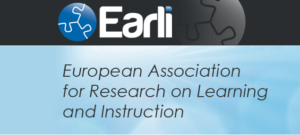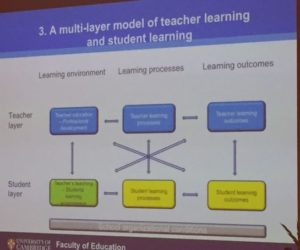 Vom 20.-22. Juni 2016 tagte die EARLI SIG 11 „Teaching and Teacher Education“ an der Universität Zürich unter dem Gesamtthema: „Diversity and Inclusion as a challenge for Teacher Education“. Leider konnte ich nur am 21. Juni anwesend sein, aber mir schien, dass die Qualität der Beiträge hoch war und es immer lebhafte Diskussionen gab, wobei für mich nicht bei allen Beiträgen der Bezug zum Hauptthema des Kongresses ersichtlich wurde.
Vom 20.-22. Juni 2016 tagte die EARLI SIG 11 „Teaching and Teacher Education“ an der Universität Zürich unter dem Gesamtthema: „Diversity and Inclusion as a challenge for Teacher Education“. Leider konnte ich nur am 21. Juni anwesend sein, aber mir schien, dass die Qualität der Beiträge hoch war und es immer lebhafte Diskussionen gab, wobei für mich nicht bei allen Beiträgen der Bezug zum Hauptthema des Kongresses ersichtlich wurde.
Besucht habe ich die Keynote von Jan Vermunt zum Thema: „Promoting student learning and teacher learning through diversity“. Er bezog sich hauptsächlich auf seine bisherigen Arbeiten und fragte sich zweierlei: (1) Weshalb hat die Forschung über das Lernen der Schülerinnen und Schüler so wenig Einfluss auf das Lehren der Lehrpersonen? Und (2) Weshalb hat die Forschung über Lehren und die Lehrerinnen- und Lehrerbildung so wenig Einfluss auf das Lernen der Sschülerinnen und Schüler? Sodann stellt er (seine) Modelle zum „Teacher Professional Development“ vor und nahm vor allem auch Bezug auf den folgenden Artikel: van Veen, K., Zwart, R. C. & Meirink, J. (2012). What Makes Teacher Professional Development Effective?: A Literature Review. In M. Kooy & K. van Veen (Eds.), Teacher Learning that Matters: International Perspectives (pp. 29-66). New York: Routledge.
 Die Hauptkritik von Vermunt geht jedoch in die Richtung, dass die meisten Modelle, nicht alle Prozesse abbilden, sondern „Black Boxes“ enthalten, weswegen er ein sogenannten „Multi layer model of teacher learning and student learning“ vorschlägt, wobei er auch noch eine dritte Ebene „Teacher Educatur Layer“ vorsieht.
Die Hauptkritik von Vermunt geht jedoch in die Richtung, dass die meisten Modelle, nicht alle Prozesse abbilden, sondern „Black Boxes“ enthalten, weswegen er ein sogenannten „Multi layer model of teacher learning and student learning“ vorschlägt, wobei er auch noch eine dritte Ebene „Teacher Educatur Layer“ vorsieht.
Sodann besuchte ich auch noch das Symposium mit dem Titel: „Expanding teacher leadership in professional development: advance in the study of facilitation“. Hier referierte zuerst Judith Warren Little zum Thema: „Examining how experienced and newly trained facilitators implement an indepth program of science professional development for elementary school teachers“.
This paper employs video, survey, and interview data from an experimental-design study of effective professional development to examine how experienced and newly trained facilitators implement a program of science PD designed to support teachers in-depth scientific sense-making and a focus on student learning. The Learning Science for Teaching Project, funded by NSF, sought to deepen elementary grade teachers science content knowledge and to enhance their science-specific pedagogical knowledge (PCK). Published results show statistically significant gains in teachers content knowledge and students content learning (compared to control teachers and their students) that were sustained after a one-year follow-up (Heller et al., 2012). Preliminary analysis of classroom video and teacher interviews also shows that teachers in the experimental group were more likely than control group teachers to pursue conceptual understanding as a goal and to support students scientific sense-making in the classroom. This paper turns attention to the question of how those learning and teaching results were achieved, and specifically to the role of the facilitator.
Sodann breitete Nanette Seago einige Resultate ihrer Studie zu „Supporting facilitators to use PD materials productively“ aus.
The focus of this paper is to characterize the relationship between a specified professional development (PD program)”including its goals, content and resources”and the manner in which a facilitator prepares to implement that program productively. Carefully examining this relationship can help suggest ways to support facilitators, promote fidelity of implementation, and ensure positive learning experiences for teachers (Seago, 2007). PD programs that are highly specified”meaning they are intended to foster a particular learning environment”generally require more upfront study and planning on the part of facilitators compared to more adaptive and flexible PD programs (Koellner & Jacobs, 2015). At the same time, any PD must include enough flexibility so that it is relevant to the local context and encourages participants to take ownership of their learning (Coburn, 2003; Darling-Hammond & McLaughlin, 1995).
Martina Jerabek sprach sodann zum Thema: „Fostering teacher learning on effective teaching and learning components in a video-based professional development program“.
Research on teacher and teaching effectiveness emphasizes on components like goal clarity and teacher support in dealing with mistakes as relevant for student learning (Goldstein & Hersen, 2000; Seidel & Shavelson, 2007). However, these components are not frequently applied by teachers (Spruce & Bol, 2014) and are rarely explicitly addressed in teacher professional development (TPD). To close this gap, in our TPD program, the Dialogic Video Cycle (DVC) (Gröschner et al., 2015), the components of goal clarity and teacher support were addressed. The DVC focuses on productive classroom dialogue and consists of three interconnected workshops; workshop 1 includes a planning of a lesson, that is videotaped afterwards, workshops 2 and 3 focus on collaborative, video-based discussions. Teachers (n=6 intervention group, IG) were facilitated to plan, teach and collaboratively exchange about the effective components. All PD workshops (6) as well as the teaching of a lesson (2 in the DVC, 2 as pre-and post-test) were videotaped. In comparison to the DVC, a group of teachers (n=4, control group, CG) participated in a traditional TPD program addressing effective components, but without video-based reflections of own teaching practice. Pre- and post-test lessons were additionally videotaped.
Und Karin Brodie zu „Facilitating professional learning communities among high school mathematics teachers“.
Professional learning communities are increasingly becoming seen as a model of professional development driven by teachers, where teachers can adopt and adapt aspects of professional development programmes to suit their own contexts. The Data Informed Practice Improvement Project (DIPIP) works with high school mathematics teachers in professional learning communities in South Africa. A key focus of the project is to develop teachers understandings of their learners thinking, through understanding the reasoning, both valid and not valid, behind learners errors in mathematics (Brodie, 2013, 2014). In drawing on learners errors, teachers can attend to both similarities and diversity in learner thinking and support the development of learners content knowledge while simultaneously including more learners in classroom discussions. Professional learning among teachers is deliberate learning, drawing on the knowledge base and evidence from classrooms (Jackson & Temperley, 2008). As such it needs to be guided and supported. Key to the success of professional learning communities are professional development leaders or facilitators (Elliott et al., 2009; Katz & Dack, 2013). How facilitators lead communities is not yet well understood and part of DIPIPs work has been to articulate and document facilitation practices, to help university- and school-based facilitators to do their work. A key element that facilitators need to attend to is how teachers in the community experience the community as an inclusive space, while simultaneously building their knowledge of mathematics and teaching and learning mathematics.
Die in den vier Beiträgen aufgeworfenen Fragen als auch mögliche Antworttendenzen sind auch für die schweizerische Lehrpersonenaus- und Weiterbildung zentral. Facilitators, Coachs oder Moderatoren im Schulalltag, welche sowohl den (fach-) und/oder erziehungswissenschaftlichen Hintergrund mitbringen als auch eine grossen praktischen Erfahrungshintergrund aufweisen sind absolut zentral, soll das „professional development“ von (zukünftigen) Lehrpersonen gewinnbringend unterstützt werden.
Zum Abschluss besuchte ich noch eine interessante, wenngleich sehr anders gelagerte Studie von Kathleen Stürmer et al., welche sich mit folgendem Thema beschäftigte: What is in the attention of preservice teachers while teaching? An eye-tracking study about attention processes during standardized teaching situations.
Teachers professional vision is seen as a key indicator for teachers expertise (Seidel & Stürmer, 2014). It describes the ability to notice and interpret situations in the classroom that are relevant for effective teaching and learning (van Es & Sherin, 2012). In the last years, professional vision research has made progress in investigating and supporting professional vision of (future) teachers while they observe their own teaching or teaching of others. However, research still lacks behind regarding the investigation of processes of attention in teaching action. Expertise research, for example, shows that novice teacher have trouble to focus on relevant situations for teaching and learning while – at the same time – distribute their attention across student. Furthermore, it has been shown that they lack the ability to pay attention to students appropriate to the students learning prerequisites (van den Bogert et al., 2014). In this study, the eye movements of per-service teachers are assessed by mobile eye- tracking technology (MET). The eye movements of N = 7 pre-service teachers while teaching in standardized teaching situations and while teaching in classroom were recorded and analyzed with regard to fixation frequency and fixation duration. In the standardized teaching situation, pre-service teachers were required to teach four simulated students with different student profiles regarding their learning prerequisites. According to assumptions of expertise research, the results show that pre-service teachers predominantly focus on individual students and their teaching material while they lack the ability to distribute their attention across student groups. The findings provide important implications with regard to the question how to support professional vision even at an early stage of professional development – for example by observing own MET videos as resource to support (future) teachers in focusing on students accordingly to their needs.

Solche Ergebnisse lieferten ja auch bereits ältere Studien – zum Beispiel diejenige von Berliner (1992) – die besagen, dass Novizinnen und Novizen des Lehrberufs sich vor allem an Details festhalten und weniger das grosse Ganze im Blick haben.
